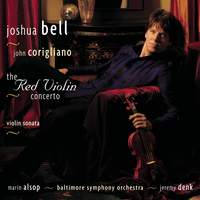Recording of the Week,
Joshua Bell
One of the things I look for in any really great musician is uniqueness. In the case of Joshua Bell that comes largely in his astonishingly beautiful sound. It has a sweetness and legato that no other violinist can match. I have always found this surprising as his posture is dreadful - he looks like he puts his body under real strain - and I wouldn't be surprised if he simply can't play in as little as ten years, but all that counts at the moment is the sound that comes out.

He is in the news at the moment following his appearance on the Last Night of the Proms and also as he has just released a new CD - a premiere in fact - of John Corigliano’s ‘Red Violin Concerto’. It is a work that has come about following the film ‘The Red Violin’ released about ten years ago.
The film is believed to be inspired by one of Stradivarius's violins, the Red Mendelssohn (1720), which according to the film had a red colour because the maker mixed some of his dead wife’s blood into the varnish. I don't believe there is any evidence for this but it makes a nice story, and it definitely has different colour from most of the other surviving Stradivarius violins (which have more of a honey-gold appearance).
Anyway, back to the music... Corigliano wrote the Red Violin ‘Chaconne’ in advance of the 1999 film. This is unusual in terms of most film music but was necessary because of the quantity of close-ups that the film required. As a result the 15-minute piece always existed in its own right, but a couple of years ago the composer decided to expand it into the four-movement concerto that Bell has now recorded.
Whether Corigliano decided to do this because of the somewhat limited performance opportunities of such a work (such a short work is very hard to programme - think of the very limited performances you see of Ravel’s Tzigane or Chausson’s Poeme) or because he genuinely felt it needed to be expanded into a full-scale concerto I don't know, but it certainly works well in the larger form.
Overall the concerto contains plenty of variety, often unashamedly romantic but with exciting sometimes Shostakovich-like faster passages as well. You can hear Barber and Mahler in the slow movement, but more contemporary techniques appear again in the finale. Joshua Bell soars gloriously throughout and this music will appeal to a wide audience as it is very listenable, but also has some new things to say.
Available Formats: MP3, FLAC



